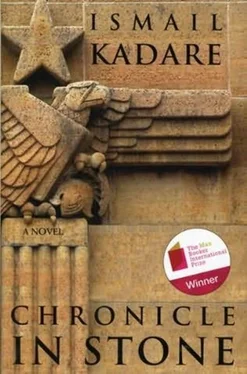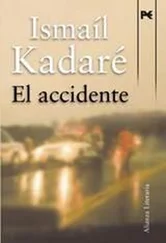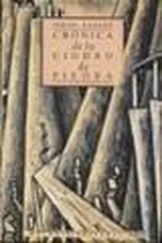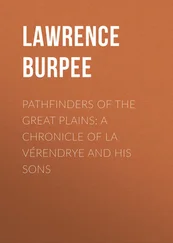Ismaíl Kadaré - Chronicle in Stone
Здесь есть возможность читать онлайн «Ismaíl Kadaré - Chronicle in Stone» весь текст электронной книги совершенно бесплатно (целиком полную версию без сокращений). В некоторых случаях можно слушать аудио, скачать через торрент в формате fb2 и присутствует краткое содержание. Жанр: Современная проза, на английском языке. Описание произведения, (предисловие) а так же отзывы посетителей доступны на портале библиотеки ЛибКат.
- Название:Chronicle in Stone
- Автор:
- Жанр:
- Год:неизвестен
- ISBN:нет данных
- Рейтинг книги:4 / 5. Голосов: 1
-
Избранное:Добавить в избранное
- Отзывы:
-
Ваша оценка:
- 80
- 1
- 2
- 3
- 4
- 5
Chronicle in Stone: краткое содержание, описание и аннотация
Предлагаем к чтению аннотацию, описание, краткое содержание или предисловие (зависит от того, что написал сам автор книги «Chronicle in Stone»). Если вы не нашли необходимую информацию о книге — напишите в комментариях, мы постараемся отыскать её.
Chronicle in Stone — читать онлайн бесплатно полную книгу (весь текст) целиком
Ниже представлен текст книги, разбитый по страницам. Система сохранения места последней прочитанной страницы, позволяет с удобством читать онлайн бесплатно книгу «Chronicle in Stone», без необходимости каждый раз заново искать на чём Вы остановились. Поставьте закладку, и сможете в любой момент перейти на страницу, на которой закончили чтение.
Интервал:
Закладка:
To be honest, the places in the city where you could see anything of interest could be counted on the fingers of one hand. Apart from the movies, which were for children and the frivolous, there were only two places you might get to see a fight, usually on Sundays: the gypsy district and the square behind the mosque, where the porters divided up their earnings. Other fights were accidental and usually broke out in unpredictable places. And recently a lot of fights had not lived up to the pre-match invective. More than once I had heard onlookers complain, “Bah, in our day they knew how to break bones,” and then walk off disappointed. Only the Gypsies and the porters really fought hard and kept almost all the promises they’d made in the run-up to the fight.
The slaughterhouse seemed to be a new amusement, so I didn’t argue.
As we trudged up the cobblestone street, we saw Javer and Maksut, Nazo’s boy, coming down. They weren’t talking to each other and looked cross. We didn’t say anything either. Maksut had always had eyes that bulged out of their sockets, and I didn’t like looking at him. One day I heard a woman arguing with a neighbour, and when she screamed “May your eyes burst from their sockets” I thought of Nazo’s boy right away, and now, every time I saw him I felt that his eyes might pop out and roll along the cobblestones and I might accidentally step on them and burst them open.
“What’s the matter?” asked Ilir. “What’s the frown for?”
“It’s Nazo’s boy. When I see him it turns my stomach.”
“Isa doesn’t like him either,” Ilir said. “Whenever his name is mentioned, Isa frowns just the way you did.”
“Really? So Isa thinks his eyes are going to pop out too?”
“Are you crazy?”
I let it drop.
There was a man coming towards us down the street, draped in a blanket, carrying a lump of bread wrapped in a piece of cloth. It was Llukan, whom people called The Shadow.
“So, you’re out of jail!” a passer-by said to him.
“Yes, I’m out.”
“When are you going back?”
“And why shouldn’t I go back? Prisons are made for men.”
Since the days of the Turks, Llukan had been in prison dozens of times for petty crimes. Everyone always remembered him trudging down the street from the citadel in just that way, with a brown blanket over his shoulders and in his hand some meagre victuals wrapped in a handkerchief.
“So, Llukan, you’re out again!” someone else said.
“Sure am, friend.”
“You could have left the blanket up there. You’ll be back soon enough.”
Llukan responded with a flood of insults. The further away he went, the louder he shouted.
We walked towards the centre of town. The streets were full of alien sounds. It was market day. Peasants were converging on the square from all over. Horseshoes clacked, slid and sparked on the cobblestones. On the hills villagers drew their horses by the bridles, their sweating, panting bodies merging with those of their animals as they dragged them upwards.
The windows of the great houses were shut tight on both sides of the street. Behind them the wives of the agas sat on soft cushions and held their noses, felt faint, and nearly vomited, complaining about the stench of the peasants wafting in from the street. Plump, with white round faces, they rarely ventured out into the city. They protested that the closing of the border with Greece had kept them from getting the eels from Lake Ioannina that were so good for their rheumatism. They found the peasants repugnant and never mentioned them without first muttering “excuse the expression,” as they did when saying the word “lavatory”. In fact, they were quite dismayed by the times they lived in, and sat in rows on their cushions sipping coffee endlessly and yearning for the return of the monarchy.
Some Italian soldiers stood guard at the cinema, watching people go by. We carried on up the street. The shop signs stretched out one after another. Tinsmith. Barber. Addis Ababa Café. Saddles. Vinegar. And a poster that began with the words “I order” in big letters.
We walked on. Now the slaughterhouse was near. You still couldn’t hear the bleating of the sheep or smell the blood, and there was no sign, but somehow it was clear that the slaughterhouse was nearby. The silent cobblestones and deserted street corner told us that we were close to it. We started up a slippery wet stairway, not at all like a set of ordinary stone steps. It was very high and its risers bore none of the carvings or decorations we were used to, not even simple ones. It was a hard climb. There was a tomb-like silence at the top. Not a sound made by man or beast. What were they doing up there? Finally we arrived. Everything was ready. The men standing around waiting nonchalantly were well dressed, with white shirts, stiff collars and neckties. Some of them wore soft felt Borsalino hats. One had an old-fashioned top hat. He looked at his watch.
We heard a splash of water. A man was watering the ground with a black rubber hose. Another man with a broom swept the water into the gutters at the side. Water splattered near our feet. We looked down and stepped back, but it was too late. The ground was full of blood. Everything must have been done before we got there. But no one made a move to leave, so they must have been getting ready for another killing. The water foamed over the broad puddles of blood, washing them from the cement pavement, and carrying them away before they could harden.
Then we saw everything. The rectangular yard was ringed on all sides by a one-storey building, also in cement. A hundred iron hooks hung from the ceiling. Below there were sheep, and among them peasants in thick black wool cloaks bending over the backs of the animals, clutching them by their wool. They too were waiting.
The group of spectators seemed in no hurry. Two of them had taken out their strings of beads and were slowly ticking them off. I had never seen them before. The one with the top hat looked at his watch. Apparently it was time.
Suddenly we saw the slaughterers, with their white coats and chapped, sinewy hands. They were standing near the fountain at the centre of the square, and they remained motionless even when the peasants began pushing the animals towards them from the stalls. There was a muffled rumble as thousands of hooves scuffed the ground. It was a low, rhythmic noise and it went on for a long time. When the first animals drew near the fountain where the slaughterers were waiting, we suddenly saw the gleam of the knives. Then it began.
I felt a pain in my right hand. Ilir’s nails were sinking into my flesh. I felt sick.
“Let’s go.”
Neither of us actually spoke those words, but we sought the stairs blindly, with our hands over our eyes.
At last we found them, ran down as fast as we could, and were off. The farther we got from the slaughterhouse, the livelier the streets were. People were going home from the market, laden with produce. Others were just on their way there. Did they have any idea what was going on in the slaughterhouse?
“Where have you been?” a voice suddenly thundered, seeming to roll from the sky. We looked up. It was Mane Voco, Ilir’s father, standing in front of us. He was holding a loaf of bread and a bunch of fresh onions.
“Where have you been?” he asked again. “Why are you so pale?”
“We were up there… at the slaughterhouse.”
“The slaughterhouse?” The onions writhed in his hand like snakes. “What were you doing at the slaughterhouse?”
“Nothing, Papa, just watching.”
“Watching what?”
The onions stopped moving; their stalks hung limply. “I don’t want you going up there again,” Mane Voco said in a milder tone. His fingers searched for something in his vest pocket. Finally he came up with half a lek. “Here,” he said, “go to the movies, both of you.”
Читать дальшеИнтервал:
Закладка:
Похожие книги на «Chronicle in Stone»
Представляем Вашему вниманию похожие книги на «Chronicle in Stone» списком для выбора. Мы отобрали схожую по названию и смыслу литературу в надежде предоставить читателям больше вариантов отыскать новые, интересные, ещё непрочитанные произведения.
Обсуждение, отзывы о книге «Chronicle in Stone» и просто собственные мнения читателей. Оставьте ваши комментарии, напишите, что Вы думаете о произведении, его смысле или главных героях. Укажите что конкретно понравилось, а что нет, и почему Вы так считаете.












